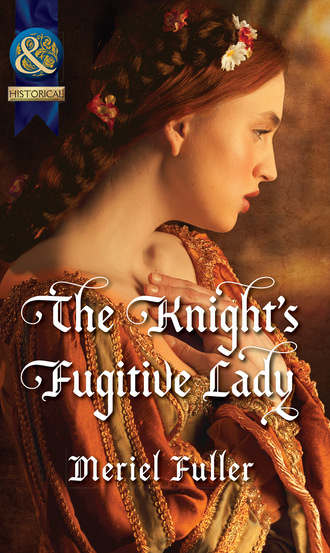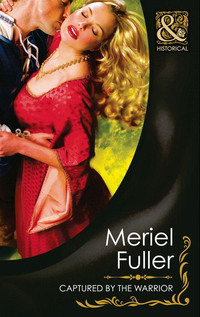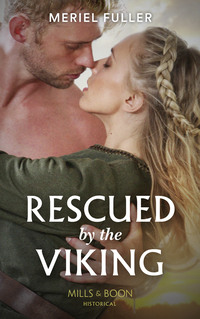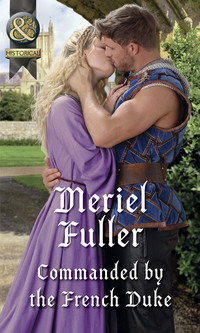
Полная версия
The Knight's Fugitive Lady
After leaving the maid at the gatehouse, Lussac hadn’t had to travel far to catch up with the Queen and her soldiers—she had already arrived at the castle with her entourage, the Earl of Norfolk welcoming her with open arms. As one of her strongest allies, he was as keen as the Queen to see the King deposed, and the King’s favourite, Hugh le Despenser, banished for good.
‘God’s teeth! How much further?’ Up ahead, in the gloom, Philippe caught his toe on a shallow step and stumbled. His voice carried the faint whine of irritation; the long day and lack of decent food were beginning to take their toll on Lussac’s companion.
‘Top floor.’ The servant, a boy of about twelve, turned and grinned down at them. ‘The chambers up here are the best in the castle.’
‘They’d better be,’ grumbled Philippe, a sheen of sweat over his florid cheeks. As the servant led the two men into the chamber, set at the top of one of the square towers, Philippe looked around in delight. Two beds, canopied with velvet, stood at opposite sides of the room, piled high with fresh linens and furs. The scent of clean straw from the newly stuffed mattresses filled the space, as did the ashy smell from the glowing charcoal brazier in the corner. The servant busied himself lighting the candles from the brazier, setting them into stone niches and metal candleholders around the walls.
‘This is Heaven.’ Philippe smiled, his gaze alighting on the wooden bath behind an embroidered screen.
The boy followed his look. ‘I’ll fetch the hot water for you, my lord.’
‘By God, we’ll sleep well tonight.’ Philippe clapped Lussac on the shoulder, throwing his leather bags down by one of the beds. ‘I can’t wait to rid myself of this infernal armour.’ He grabbed at the heavy buckle of his sword belt, flinging both sword and belt in a jumble at the side of the bed.
‘I suggest you take the first bath, you stink to high heaven,’ Lussac chuckled, moving over to the window. No arrow slits, but narrow, rectangular windows topped with a shallow arch, one pair set into each of the thick stone walls. Hand-blown glass, undulating, formed an effective barrier against the cold outside. Despite the dimming light, he could still discern several features of the landscape: the frothy white line of the surf out to the east, the forest to the south, the flat marshland, water-filled ditches gleaming in the half-light. Their ships had landed to the south of the vast tract of trees, the reason why, initially, they had no idea of their location. Lussac leaned forwards, palms flat on the damp stone window-ledge, his breath misting the glass. Behind him, the boy had returned, sloshing water liberally into the bathtub.
‘Last chance, Lussac?’ Philippe said. ‘Otherwise I’ll go first.’
‘Go ahead,’ Lussac murmured. He turned away from the window, a restlessness churning his body. His eye swept the room: the charcoal brazier, the fragrant steam rising from behind the embroidered screen, the lavender-scented linens. The domestic niceties burned into his soul, for everywhere he looked reminded him of the home he had no longer. It had been easier in France; the French king had constantly needed him to head up the battles and skirmishes along the borderlands of Aquitaine and Gascony. The canvas tent had become his refuge: no niceties, no luxury. He longed for it.
‘Where did you get to, anyway?’ Philippe called out from behind the screen. ‘Mortimer’s soldiers came back long before you did. Did you get lost?’ His chuckle was accompanied by a huge splosh of water. ‘Lussac?’
‘Aye, in a manner of speaking.’ His mind tacked back to the girl in the forest. The impact of her soft curves as they landed together in the pile of leaves. The touch of her fingers on his back as she stumbled and grabbed his belt. Fire leapt in his belly. A pulse of burning, outrageous desire.
Annoyed, he sat on the edge of the bed and pulled at his chainmail coif, yanking it over his head. What was the matter with him? The girl was nothing more than a minor distraction—and a puzzle. Her skin had been smooth like pouring cream, velvety. Not the coarse, weather-roughened skin of a peasant. She dressed as a boy, in rags, yet spoke with the high, modulated tones of the nobility. A patched and holed tunic clothed her slight body, baggy braies folded loosely around her slim legs. Her boots had been too big for her. He frowned, resting his elbows on his knees, and rubbed his face with his hands. Would he see her again, here in the castle? He couldn’t quite believe she was a serving-girl. Her manner had been too arrogant and feisty, a bundle of contradictions, diamond-grey eyes assessing him disparagingly. She had truly believed she could best him. Where had she learnt such a misguided sense of self-reliance?
‘Go on in, the water’s still hot.’ Philippe emerged from behind the screen, his portly frame wrapped in linen towels.
Lussac lifted his face from his hands and began to pull his boots off. Why on earth was that foolish chit intruding on his thoughts at all? He had done his duty and brought her home. The maid had wasted his time by refusing his help, deluding herself by insisting she was safe. She was nothing to him—a mere irritant. He had bigger and more pressing concerns to deal with: a murderer to hunt down, not some will-o’-the-wisp who threatened his iron-clad self-control.
* * *
The Earl of Norfolk’s castle was constructed in a novel design: a central circular tower of five levels, surrounded by three square towers. The design had been hailed as revolutionary, removing all blind spots and making it difficult for attackers to creep up unnoticed. The double height of the great hall meant that it spanned two floors, allowing for large, wrought-iron chandeliers to be hung from the wooden-planked ceiling. Huge, elaborately embroidered tapestries draped from the pale, limestone walls interspersed with the shields and crossed swords from various members of the Earl of Norfolk’s family. The whole effect was one of glittering opulence, of luxury, the rich, glowing colours of red and gold reflected in the light from the candles, from the roaring fire in the grate.
Seated in the centre of the top table, behind an expanse of white-linen tablecloth laid with silver dishes, Queen Isabella laid her small, cool hand on that of her neighbour, Thomas, the Earl of Norfolk. The silk of her rose-pink gown, interwoven with silver thread, sparkled as she leaned a little closer to him. As in the fashion of France, the gown was closely fitted to her slim form, with a low, curving neckline and sleeves tight to her arms, fastened with a long row of tiny horn buttons.
‘I don’t know how to thank you, Thomas, for your hospitality, for your support.’ She raised her voice over the general hubbub of the hall, the usual numbers swelled by the influx of her entourage, her knights. The rest of the mercenaries were camped in the outer bailey, their supper cooked over open fires by the castle servants.
Thomas, his frame big and bulky next to the neat, precise form of the Queen, tipped his grizzled head down to catch her words. His hand squeezed hers. ‘You can thank me by ridding this country of your husband’s rule; him and that...that infidel Despenser! I fully support your cause, you and Mortimer, and will give you some of my knights, if it will help.’
Isabella tucked a wayward strand of hair back behind her ear; the fine blonde strands had escaped from the confines of her white-satin wimple. The movement was studied, careful. She was fully aware of her effect upon men; indeed, she delighted in seeing Thomas’s eyes widen with attraction as the curve of her arm carried upwards. It was only when she caught Mortimer’s scowling features behind Thomas that she stopped her flirtatious affectations, letting her hands fall demurely to her lap. To lose Mortimer as a lover would be a mistake; he was instrumental in helping her overthrow the King, as well as being everything that Edward was not: courageous, possessive and ardent in his love for her.
‘You are so kind,’ she ventured, reaching for her silver goblet, sipping at her wine.
‘You and your ladies have suffered much in the journey from Hainault.’ Thomas nodded towards the group of whey-faced ladies clustered around a trestle table. ‘I will do my best to ensure they have every comfort after such an ordeal.’
‘They are exhausted,’ Isabella admitted tightly, tilting her head towards him. In the candlelight her skin seemed poreless, smooth perfection, emphasised by the brightness of the escaping wisps of her hair, her white, even teeth. ‘None of us slept much on the crossing. The weather was against us all the way, simply foul, unbelievable.’
‘Then we must thank the Lord that you are here safe and sound.’ Thomas’s tone was reassuring. ‘And now, you must eat.’ His hand swept over the laden table, the gleaming dishes groaning with roasted pheasant and partridge, yeasty bread rolls. ‘I have a spectacular show prepared for later in the evening—I hope you will stay to watch?’
Inwardly, Isabella groaned. She had been looking forward to an early night, a night spent in a proper bed that didn’t pitch and toss and roll. But one look at Thomas’s beaming, avuncular features indicated she couldn’t disappoint him. She threw him an encouraging smile, helping herself to a slice of roast chicken.
‘Who are your commanders?’ Thomas continued conversationally, chewing on a piece of pork crackling.
‘Obviously Roger has overall command.’ She smiled briefly at her lover; his eyes flicked upwards at the mention of his name, but his face remained neutral. It wouldn’t do to display their adultery for all to see; Isabella was still married to the King of England. The public would judge her harshly if she were seen to be embarking upon an adulterous affair. ‘Hugh de Fontainbleu, Sir John of Hainault, among others.’
‘What about Belbigny?’ the Earl of Norfolk asked. ‘You do not mention him, yet I see him at the end of the table.’ He indicated the tall, dark-haired man.
‘No, no. He is here...’ the Queen paused, delicately, picking at a loose thread on her linen napkin ‘...on other business. It’s a shame, he’s a skilled commander, but unfortunately, at the moment, he has other things on his mind.’ She sighed, staring out over the bobbing heads of the crowded hall.
‘I heard what happened to his family,’ the Earl replied. ‘His father was in charge of a garrison on the border, is that right? The whole family was slaughtered in the conflict?’
‘It was worse than that. The conflict had supposedly finished and a truce had been established, but someone held a grudge against Lussac’s father, returned to the garrison with a group of soldiers and fired the whole place.’
‘I had no idea.’
‘He will travel with us; he hopes to find someone who can shed light on the identity of whoever killed his family. I don’t suppose you have heard anything?’
The Earl of Norfolk shook his head.
‘Then let’s not speak of it further. I don’t want him to hear, not a breath of it.’ Beneath Isabella’s long white fingers, the gemstones on her rings winked in the candlelight as she crumbled a bread roll to tiny bits, scattering them across her silvered plate.
Thomas studied the man at the end of the table covertly, leaning back in his chair, sipping idly from his goblet. Lussac felt the touch of his gaze and turned, pinning the Earl with his hard, dark stare. Thomas raised his goblet in salute, noting the hollowed-out eyes, the lean, ravaged features. What a waste, he thought to himself, as he switched his attentions to Isabella once more. There’s a man who suffers, tortured by what happened to his family. But what man wouldn’t suffer after what he had been through?
Конец ознакомительного фрагмента.
Текст предоставлен ООО «ЛитРес».
Прочитайте эту книгу целиком, купив полную легальную версию на ЛитРес.
Безопасно оплатить книгу можно банковской картой Visa, MasterCard, Maestro, со счета мобильного телефона, с платежного терминала, в салоне МТС или Связной, через PayPal, WebMoney, Яндекс.Деньги, QIWI Кошелек, бонусными картами или другим удобным Вам способом.





